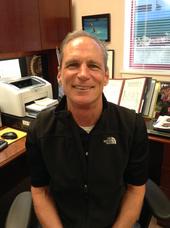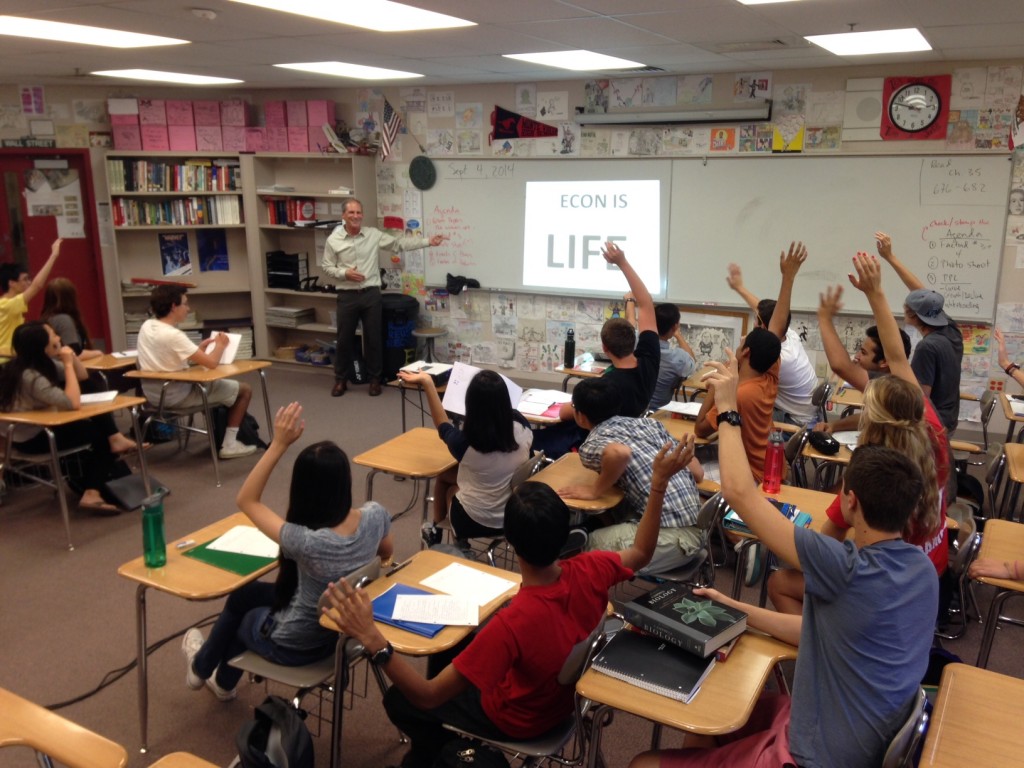Our Spotlight series continues this week, where we talk with teachers who are making a difference in the field of economic education.
 In today’s installment, we’re talking with Greg Blandino, who teaches AP economics (micro and macro) and college prep economics at Monte Vista High School in Danville, CA.
In today’s installment, we’re talking with Greg Blandino, who teaches AP economics (micro and macro) and college prep economics at Monte Vista High School in Danville, CA.
Here is what he had to say:
How long have you been teaching economics? What do you love most about it?
I’ve been teaching economics for 27 years. I love when students connect their day-to-day behavior to economics ideas, theories, and principles discussed in the classroom.
What are your biggest challenges in teaching economics?
One of the biggest challenges in teaching economics is the lack of student preparation throughout their K-12 education. Key economic principles and benchmarks of the 4th and 8th grades as outlined by the Voluntary National Content Standards in Economics (2010) and the California State History-Social Science Content Standards (1998) get overlooked. K-12 social studies teachers have so much material to cover that economic principles, concepts and ideas are neglected.
Another challenge is to overcome the students’ preconceived idea that economics is a “dismal” subject. Some of this stems from their lack of familiarity with the subject and/or stories they have heard from their parents or older adults.
This being said, nothing excites me more when faced with these challenges than to connect students to one of the key driving forces in their life – economics! I have a saying in my class: “Economics is Life.” It is my task to connect the two.
(Interview continues below the picture)
 You’re currently serving on the SF Fed Educational Advisory Group (EAG). How has the experience changed your teaching and/or your professional development?
You’re currently serving on the SF Fed Educational Advisory Group (EAG). How has the experience changed your teaching and/or your professional development?
After teaching economics for a couple of decades, I thought that I knew all that was needed to teach at the high school level. I was wrong! The SF Fed EAG has surrounded me with motivated, professional teaching colleagues who have challenged and inspired me to want to know more about economics and my leadership role within this field. The SF Fed is generous with its resources – from access to PhD Fed economists to research/policy papers and multi-media presentations, all of which translate to more effective teaching with student engagement.
What economics education project or topic are you working on that excites you?
I have recently started to align my economics coursework with the Common Core State Standards (CCSS). My goal is to align two major lessons per semester with these Standards.
What has been a recent impactful experience that involves your students and economics education?
Last spring, I expanded a yearly field trip to the SF Fed to include a walking tour of the San Francisco Financial District.
While half of the group was on the bank tour, the other half participated in a walking tour and treasure hunt of important and historical business institutions of the San Francisco Financial District. Students drew, etched and took selfies as they documented their progress on the walking tour. Many students commented that they had never appreciated the rich business/commercial environment along with the architectural beauty of the Financial District.
Students were excited to visit the SF Fed, an institution that they studied so much about during our semester on macroeconomics. Janet Yellen had just recently been appointed as the Fed Chair and students wanted to see “her bank.” They were able to experience the formal, professional banking environment, visit the American Currency Exhibit and of course, see the cash vault.
What advice would you give you teachers (of any subject) who would like to insert more economics into their lessons but aren’t sure where to start?
The internet has made it so easy to find educational economic resources. I typed “economic education resources for teachers” into a search engine and found about 27,500,000 hits. The first ten resources listed on the search page are some of the best economic education resources available to teachers and of which I still actively use.
In addition to the SF Fed’s educational resources, also visit:
EconEd Link
FRB St. Louis’ educational resources
EcEdWeb at the University of Nebraska
Council for Economic Education’s resources
Foundation for Teaching Economics
Thanks for talking with us, Greg!
And in case you missed it, check out previous posts in the series:
Cheryl Shea of Pinnacle High School (Phoenix, AZ)
Stan Herder of Hawaii Baptist Academy (Honolulu, HI)
Jonnie Fenton of Hanford High School (Richland, WA)
